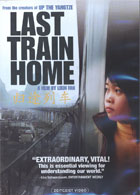
Last Train Home 2009
Distributed by Zeitgeist Films, 247 Centre Street, New York, NY 10013; 212-274-1989
Produced by Eyesteel Films
Directed by Lixin Fan
DVD, color, 87 min., in Mandarin and Sichuan dialects with English subtitles
General Adult
China, Migrant Workers, Family Communication
Date Entered: 05/20/2011
Reviewed by Hong Cheng, Instruction/Reference Librarian, Indiana University Southeast, New Albany, INMigrant workers in China are mostly former farmers who flow to urban and prosperous coastal regions for labor-intensive jobs. While they make tremendous contributions to the economic boom, the rail system is overburdened during the Lunar New Year when over 130 million migrant workers take trains home. This is considered to be the biggest migration for human beings. Last Train Home documents more than the trips of a family from a small town in Sichuan Province, it reveals the status quo of Chinese migrant workers, including their work insecurity, alienated family relationships, and emerging cultural and psychological barriers.
The Chinese-Canadian filmmaker Lixin Fan spent four years with the family, including the father Changhua Zhang, mother Suqin Chen and the 16-year-old daughter Qin Zhang, and featured different kinds of conflicts in the family. With the high expectation of going to college but with limited communication and care from the parents, Qin dropped out of high school and chose to work in a garment factory like many of her peers. Although the affection between two generations still exists, it fades away as the daughter is eager to live independently without solid consideration of her future. Severe domestic violence occurred when the daughter impulsively used curse words to her father and this almost brought about the end of the family relationship with Qin.
The film showcases excellent cinematography. Shooting in the train station is not an easy task since the staff had to go through ridiculously massive crowds and endless waiting for a delayed train. As for the language, Mandarin and Sichuan dialect are mainly used and the subtitles in English are available as well. There are a couple of translations which need to be tweaked, but they don’t affect the accuracy of the information and the emotional delivering.
Special features include deleted scenes from “Guangzhou Train Station,” “Travelogue: Guang’an to Shenzhen City” and the “U.S. Theatrical Trailer.” Moreover, the DVD also comes with the Q&A with Lixin Fan, adding unique ideas and thoughts from the director’s perspective. Along with the growing coverage of migrant workers’ well-being, career opportunities, and children’s public education from the media, this emotionally engaging film is very highly recommended to people who are interested learning about the issues mentioned above.
Awards
- 2010 CanWest Award for Best Documentary at the Victoria Film Festival
- 2010 Best Cinematography at the Los Angeles Asian Pacific Film Festival
- 2010 Best Documentary at the Riverrun Film Festival
- 2010 Golden Gate Award in the Investigative Documentary Feature Category at the San Francisco International Film Festival (SFiFF)
- 2009 Cinémathèque Québécoise Best Quebec film award at the Rencontres Internationales du Documentaire de Montréal (RIDM)
- 2009 Best Feature-Length Documentary at the 22nd Annual International Documentary Film Festival Amsterdam (IDFA)
- 2009 Best Feature Documentary at the Whistler Film Festival